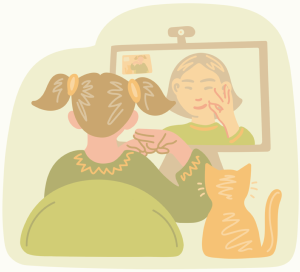
In the latest tip sheet from AccessATE and DeafTEC, we covered workplace communication recommendations, expectations, and standards for deaf and hard-of-hearing (HH) employees. Many of us have experienced significant changes to our jobs and workplaces because of the COVID-19 pandemic, and many of those changes have been difficult, but especially so for employees with disabilities. Here, we will discuss some COVID-related workplace obstacles faced by deaf/HH employees in particular, and some potential solutions to those problems.
Tip Sheet: Workplace Communication for Deaf & Hard-of-Hearing Employees
A common change to the workplace, and to everyday life, brought by COVID-19 is wearing face masks when in public. Masks help prevent the spread of the virus, but unfortunately, they can also add challenges for deaf/HH people. Masks obscure the face, creating a significant communication barrier. A clear view of the face is important not only for deaf/HH people who lipread (which not all can or do), but also for those who use sign language. Sign language can lean heavily on facial expressions expression and context, and many signs are made in relation to specific spots on the face; without these aspects, sign language can be difficult to understand even to the most fluent signers. To address this, masks with a clear panel have become a popular solution. Developed in 2017 by Allysa Dittmar, co-founder/president of ClearMask and a deaf person who had trouble communicating with operating room doctors when her interpreter didn’t show up. These masks have a clear plastic panel that allow for an unobstructed view of the mouth, making communication easier for deaf/HH people while still maintaining safety.
In light of the pandemic, many workplaces have opted to have their employees work from home. One positive result of this is a general shift toward an increase in use of non-verbal/non-audial communication, such as emails and chat services, which are excellent options for deaf/HH employees. However, working from home is not without issues for deaf/HH people. If employers do not provide the necessary resources, these employees can find it difficult to get their work done or communicate with their coworkers and supervisors. Video calls have become popular, which can work for deaf/HH people who lipread, but it’s still not ideal. The audio or video quality may not be sufficient to enable them to lipread, and, in light of medical services being overwhelmed by the pandemic, even deaf/HH people who used to be fine using video/audio calls may not be able to anymore due to difficulties getting treatment or maintenance on their devices. For deaf/HH employees who do not lipread, phone and video calls are inaccessible without captioning or an interpreter. Some video call services have a closed captioning and/or live transcription service, such as Zoom.
An unfortunate result of the COVID-19 pandemic has been sweeping unemployment, which has affected people with disabilities more than those without. Now that vaccines are available and employers are hiring again, deaf/HH people – 53.3% of whom are currently unemployed – are finding even more obstacles than usual while job hunting. Many deaf/HH people are struggling to find work despite qualifications, as employers are even more hesitant to take on workers with disabilities. The solutions to this problem, unfortunately, often seem to fall entirely on the deaf/HH applicant. Applicants are advised to be ready to provide their own accommodations during the interview (though the employer is, technically, supposed to do so, in accordance with the ADA). Many deaf/HH people are finding leads in utilizing community resources to find job openings, get recommendations, and more. Some have found it helpful to explain to potential employers how they’ve been accommodated previous jobs, and especially how it was simple and easy to do so.




 See More Feature Articles
See More Feature Articles